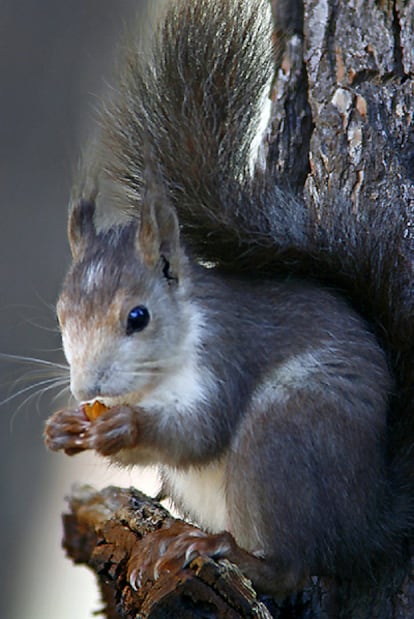Squirrels drive Mariola nuts
Farmers concerned by numbers and damages caused
Thousands of squirrels inhabit the wooded zones in the interior of Alicante province on Spain's southeastern coast. They have few predators; they eat nuts and seeds, and breed rapidly. Over-population of squirrels in the Sierra de Mariola is creating malaise among farmers, who are suffering damage and losses, but ecologists point out the animals are protected and their population will regulate itself with time.
The proliferation is worrying to farmers because these rodents devour almonds and walnuts, while recently there have been several breakages of drip-irrigation tubing at some farms, such as Mas de Roc, near the town of Alcoi. The farm's manager, Enrique Mas, says: "The squirrels are a plague, they have no predators and they're destroying my crops." Mas de Roc is a 20-hectare property planted with fruit trees (cherry, peach, apple and pear), using drip-irrigation systems.
"The problem is, they have discovered that by gnawing into the plastic they can get a drink of water, and I have spent more than ¤6,000 in labor alone fixing leaks caused by squirrels. There are too many of them - we are getting worried," admits Gonzalo Cots, another farmer in the area.
However, the experts consulted - forest technicians and conservationists - take a less dramatic view. "I suppose a time will come when it will regulate itself," says Carlos Mansanet of ecologist group La Carrasca in Alcoi. "It's an autochthonous species and it's protected. Lack of predators and abundance of food cause this overpopulation, but they are not a problem," says Carlos Esteve, a forest engineer.
The Greek word skiouros means approximately "that which casts a shadow with its tail." It's from there the names esquirol in Valencian and squirrel in English are derived. This particular variety of the tree-climbing rodent was first seen in the Sierra de Maigmó in 1993. In a few years it had spread through the natural park of Font Roja, the pine forests of Camas, Penàgila and Benifallim, and the Sierras of Mariola and Aitana. The forest engineer Àlvar Segui, and his son, also Àlvar, an environmental officer, confirm that there are "hundreds, thousands" of them in the interior districts, but say they are not harmful - quite the contrary. "They have adapted perfectly, we have seen them carrying materials to make their nests in spring, which shows that they are reproducing normally," say the two experts, who defend the "positive ecological role" of these rodents.
The squirrel may attack some nests of birds, but is "a major repopulator, and an ally of the forest," though it eats pine-nuts. Seguí notes that squirrels do not hibernate, and spend a great deal of time gathering, and squirreling away in the ground, a variety of seeds and nuts (acorns, walnuts, hazelnuts, pine-nuts), some of which germinate and grow into trees. Unlike rabbits and rats, who move by night, squirrels are active in the daylight hours. "The population will regulate itself, there will be a natural selection," predicts Carlos Esteve.

Tu suscripción se está usando en otro dispositivo
¿Quieres añadir otro usuario a tu suscripción?
Si continúas leyendo en este dispositivo, no se podrá leer en el otro.
FlechaTu suscripción se está usando en otro dispositivo y solo puedes acceder a EL PAÍS desde un dispositivo a la vez.
Si quieres compartir tu cuenta, cambia tu suscripción a la modalidad Premium, así podrás añadir otro usuario. Cada uno accederá con su propia cuenta de email, lo que os permitirá personalizar vuestra experiencia en EL PAÍS.
¿Tienes una suscripción de empresa? Accede aquí para contratar más cuentas.
En el caso de no saber quién está usando tu cuenta, te recomendamos cambiar tu contraseña aquí.
Si decides continuar compartiendo tu cuenta, este mensaje se mostrará en tu dispositivo y en el de la otra persona que está usando tu cuenta de forma indefinida, afectando a tu experiencia de lectura. Puedes consultar aquí los términos y condiciones de la suscripción digital.








































